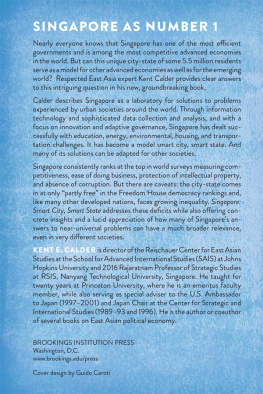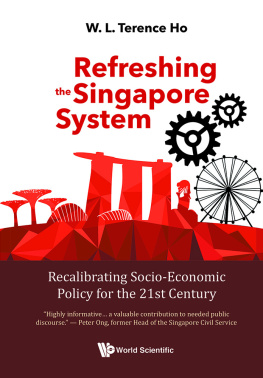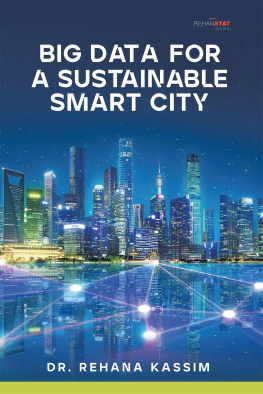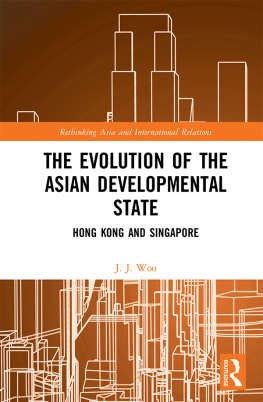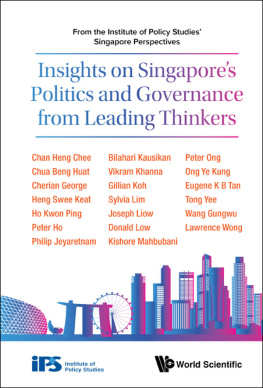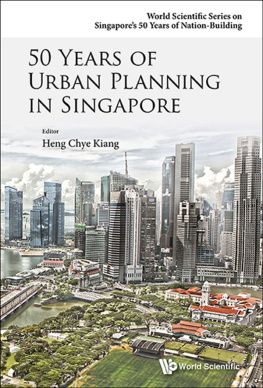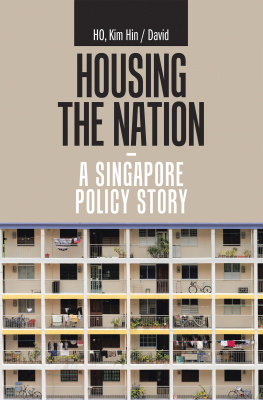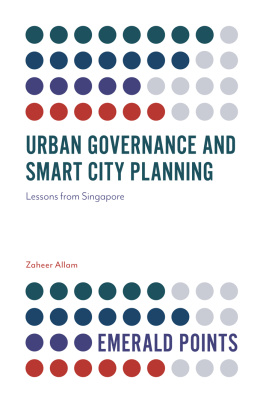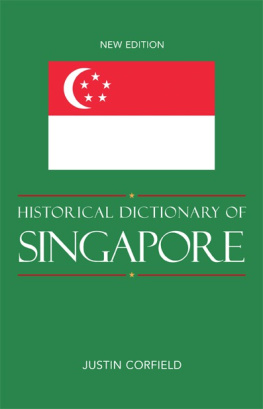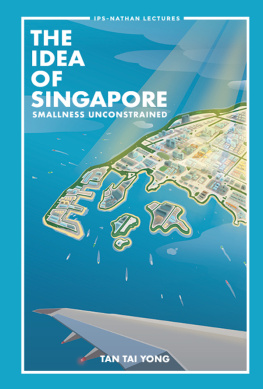
SINGAPORE
SMART CITY SMART STATE
KENT E. CALDER
Brookings Institution Press
Washington, D.C.
Copyright 2016
THE BROOKINGS INSTITUTION
1775 Massachusetts Avenue, N.W., Washington, D.C. 20036
www.brookings.edu
All rights reserved. No part of this publication may be reproduced or transmitted in any form or by any means without permission in writing from the Brookings Institution Press.
The Brookings Institution is a private nonprofit organization devoted to research, education, and publication on important issues of domestic and foreign policy. Its principal purpose is to bring the highest quality independent research and analysis to bear on current and emerging policy problems. Interpretations or conclusions in Brookings publications should be understood to be solely those of the authors.
Library of Congress Cataloging-in-Publication data
Names: Calder, Kent E., author.
Title: Singapore : smart city, smart state / Kent E. Calder.
Description: Washington, D.C. : Brookings Institution Press, [2016] | Includes bibliographical references and index.
Identifiers: LCCN 2016029970 (print) | LCCN 2016037654 (ebook) | ISBN 9780815729471 (paperback : alkaline paper) | ISBN 9780815729488 (ebook)
Subjects: LCSH: SingaporePolitics and government1990 | SingaporeSocial policy. | SingaporeEconomic policy. | Urban policySingapore. | City and town lifeSingapore. | Community lifeSingapore. | City-statesCase studies. | GlobalizationCase studies. | BISAC: BUSINESS & ECONOMICS / International / Economics. | POLITICAL SCIENCE / Globalization. | BUSINESS & ECONOMICS / Development / Economic Development.
Classification: LCC DS610.7 .C35 2016 (print) | LCC DS610.7 (ebook) | DDC 959.5705dc23
LC record available at https://lccn.loc.gov/2016029970
9 8 7 6 5 4 3 2 1
Typeset in Adobe Garamond and Myriad Pro
Composition by Cynthia Stock
To my students across the years,
who have so often become my teachers,
as the years roll by.
Contents
Acronyms and Abbreviations
ALS | Area Licensing Scheme |
CAAS | Civil Aviation Authority of Singapore |
COE | Certificate of Entitlement |
COP | Conference of the Parties |
CPF | Central Provident Fund |
CREATE | Campus for Research Excellence and Technological Enterprise |
EAGLES | Edusave Awards for Achievement and Good Leadership and Service |
EDB | Economic Development Board |
EIP | Ethnic Integration Policy |
EMA | Energy Market Authority |
ERP | Electronic Road Pricing |
FDPA | Five Power Defense Arrangements |
FSA | Financial Services Agency (Japan) |
GIS | Genome Institute of Singapore |
GLC | Government-linked company |
GST | Goods and services tax |
HDB | Housing and Development Board |
ICT | Information and communications technology |
IES | International Enterprise Singapore |
INSEAD | Institut Europen dAdministration des Affaires |
IoT | Internet of Things |
JTC | Jurong Town Corporation |
LTA | Land Transport Authority |
MAS | Monetary Authority of Singapore |
NHB | National Heritage Board |
NRF | National Research Foundation |
NTUC | National Trades Union Congress |
NUS | National University of Singapore |
PA | Peoples Association |
PAP | Peoples Action Party |
PPS | Principal private secretaries |
PSC | Public Service Commission |
PTC | Public Transport Council |
PUB | Public Utilities Board |
RSIS | Rajaratnam School of International Studies |
SCE | Singapore Cooperation Enterprise |
SCP | Singapore Cooperation Program |
SEZ | Special economic zone |
SIMEX | Singapore International Monetary Exchange |
SIT | Singapore Improvement Trust |
STB | Singapore Tourism Board |
SWF | Sovereign wealth fund |
URA | Urban Redevelopment Authority |
VAT | Value added tax |
VQS | Vehicle Quota System |
WSQ | Workforce Qualification System |
Preface
One size never fits allneither in tailoring nor in the real world. An increasingly global world, however, has an inevitable thirst for paradigmsconcrete cases that can yield insight into the origins of the wealth, stability, and well-being of nations. Few are timeless, and virtually all such paradigms are profoundly related to their times.
The early twenty-first century, it is increasingly clear, is the era of the Digital Revolution. The deepening power of computing and telecommunications, coupled with their deepening integration, is radically reconfiguring economics, politics, and administration around the globe. In this radically new and volatile environment, international business and political centers must urgently study both best practice and emerging challenges from one another.
I went to Singapore first as a boy of eight, on vacation with my family from Burma, where my father was helping to establish a School of Business Administration at the University of Rangoon. I still remember the vivid orange of the flame trees along the road from Changi Airport, as we first arrived, while Singapore still slept under colonial rule. That natural beauty has continued to impress me over the twenty-odd trips I have made back to the Lion City over the intervening half century and more.
Apart from the continuity of the flame trees, however, Singapore for me has over the years been a fascinating whirlpool of continual change. In this book, my first effort at conceptualizing developments in Singapore since The Eastasia Edge , published in 1982, I have focused particularly on the city-states adaptability. I have been curious as to how and why that once somnolent Southeast Asian nation has morphed into a paradigm of pragmatic, technologically sensitive policy adaptation of relevance to both developing and advanced industrial nations throughout the world.
A diverse and remarkable group, to whom I owe a profound debt of gratitude, has accompanied me on various stages of this intellectual journey. First, of course, are a loyal and unfailingly helpful group of Singaporean students, who have consistently been among the most able students with whom I have worked, at all of the three schools where I have taught. Khoo Boon Hui, a member of one of my first public policy seminars at Harvard, who later served with distinction as Singapore commissioner of police and president of Interpol, offered generous advice and correction on this manuscript, for which I am grateful. Serene Hung, my very last Princeton student, and the very first Reischauer Policy Research Fellow at SAIS, before leaving for the Harvard Government Department began the research that culminated in this book. Eric Teo, Alpana Roy, Kaijiun Wong, and Jason Ho, among others, are additional brilliant Singaporean students who have become my teachers and contributed to the work presented here.
Next page
